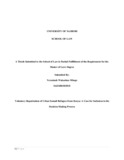| dc.contributor.author | Mbogo, Veronicah W | |
| dc.date.accessioned | 2017-01-06T08:12:06Z | |
| dc.date.available | 2017-01-06T08:12:06Z | |
| dc.date.issued | 2016 | |
| dc.identifier.uri | http://hdl.handle.net/11295/99516 | |
| dc.description.abstract | Voluntary repatriation is enshrined in the international human rights instruments as the right to return to one’s own country. This implies that any person – including refugees – must be able to exercise the right. Under international refugee law, voluntary repatriation is provided as protection against refoulment by the host state. My thesis argues that in order for the urban Somali refugees to make an informed choice on whether or not to repatriate they must be involved in the decision making process.
As of now, the key stakeholders in the decision making process to voluntarily repatriate Somali refugees from Kenya are the United Nations High Commissioner for Refugees (UNHCR), the Government of Kenya (GOK) and the Federal Government of Somalia (FGS). Somali refugees have been excluded in the decision making process. This therefore implies that the refugee has no choice but to repatriate. | en_US |
| dc.language.iso | en | en_US |
| dc.publisher | University of Nairobi | en_US |
| dc.rights | Attribution-NonCommercial-NoDerivs 3.0 United States | * |
| dc.rights.uri | http://creativecommons.org/licenses/by-nc-nd/3.0/us/ | * |
| dc.title | Voluntary Repatriation of Urban Somali Refugees From Kenya: a Case for Inclusion in the Decision Making Process | en_US |
| dc.type | Thesis | en_US |



